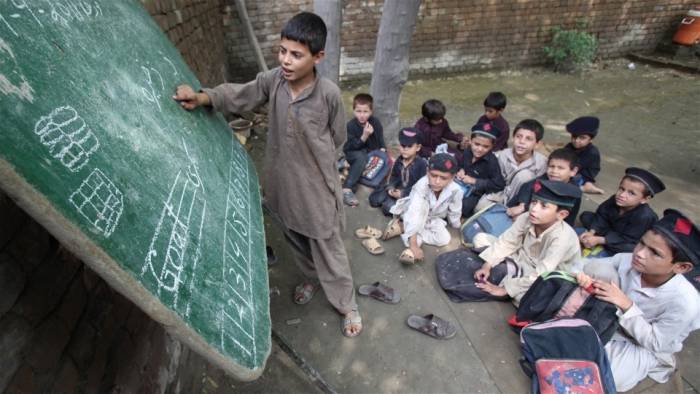Alif Ailaan a campaign which aims to bring education at the front and center of public discourse in Pakistan, has a goal to enroll every Pakistani girl and boy in school and not only keep them learning but ensure quality education, recently collaborated with the Pakistan Alliance for Math and Science to launch a report on ‘Powering Pakistan for the 21st century: The State of Math & Science in Schools.”
Schools in Pakistan, especially in the public sector produce students with a worryingly low level of learning outcomes in key subjects like mathematics and science, present significant and deep-rooted challenge to the country’s economic growth.
According to the report the average maths score for Class VIII in the Pakistan National Education Assessment System (NEAS) exams during 2014 was 461 out of 1,000; whereas the score for Class IV was 433 out of 1,000.
The 2016 results of the Punjab Examinations Commission (PEC) showed that average maths scores for Class V are 53%; and the results for Class V were 48%.
During the same period (2016) the Standardised Achievement Test (SAT) results in Sindh were an average of 24% for maths scores for Class V; similarly Standardised Achievement Test (SAT) results for Class V were 24%.
The report says that students in Islamabad, although score the same as the national average in math yet lagged behind in science. The report places Sindh and Federally Administered Tribal Areas (FATA) behind other provinces and regions.
The statistics for middle school maths and science results for children from Khyber Pakhtunkhwa, Balochistan, Gilgit Baltistan, Azad Jammu and Kashmir, or the Federally Administered Tribal Areas were not available from the Provinces and the data of the NEAS given above is indicative of the low performance of the students overall.
The findings of the study as given in the report indicate that the middle level school children do not gat a decent maths or science education and thus cannot compete in these subjects at a later stage.
The report highlights the fact that five fundamental reasons are responsible for the poor outcomes of maths and science education.
First, the political economy of maths and science education is designed to look after the interests of small groups, instead of the Pakistani children at large.
Second, the structures of the school system which should deliver a decent education are outdated and inefficient and are not geared to deliver a 21st century education to the neediest and most vulnerable segment of society.
Third, government schools do not provide satisfactory learning outcomes in maths and science (or in any other subject areas for that matter).
Fourth, teachers in government schools do not have the incentives, or the skills to deliver quality maths and science instruction to children.
Fifth, the content delivered to children, and testing instruments irrespective of what is being learned are unacceptably low grade, and ineffective.
Recently in the Punjab, and now in all the provinces, teacher recruitment has been de-politicised, and merit-based recruitment is now used as the standard methodology for hiring teachers. Since 2013, a total of over 125,000 teachers have been hired on merit, and these now constitute almost 20% of the total number of teachers in the country which is an important but small beginning.
The Volume III of the Powering Pakistan for the 21st Century, the Pakistan Alliance for Maths and Science report offers a roadmap, which when developed in consultation with all four provincial governments, as well as civil society and the private sector will go a long way to overcome this problem and as a result Maths and Science education and testing will be of a level that will make the student capable of achieving the required outcomes in these subjects to benefit them and Pakistan in the future.






